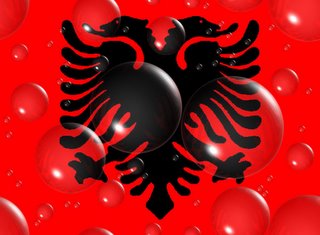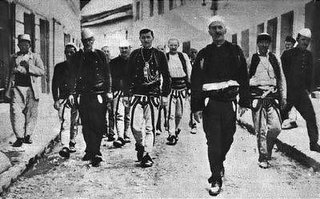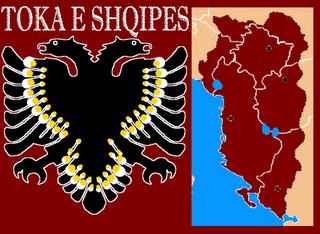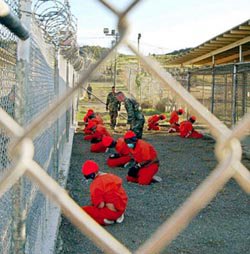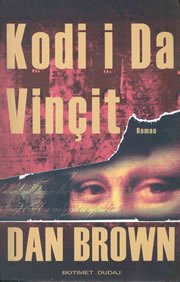Dua te prezentoj 4 pjes te nje shrimi nga autori Sam Vaknin i cili diskuton veshtersit te nje Shqiperi te madhe dhe disa divizione qe kemi tek ne Ju lutem komentoni nese e lexoni ket artikuj me disa mendime dhe analzia.
POASHTU MUNDENI TE LENI NJE KOMENT PO APO JO PER NJE BASHKIM TE TILLE.
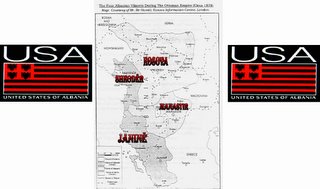
THE MYTH OF ALBANIA by Sam Vaknin
Introduction To the politicians of the Balkans - almost without exception corrupt and despised by their own constituencies - the myth of Great Albania comes handy. It keeps the phobic Macedonians, the disdainful Serbs and the poor and crime ridden Albanians united and submissive - each group for differing reasons.
To reiterate, it is the belief that people of Albanian extract, wherever they may be, regard their domicile as part of a Great Albania and undertake all efforts necessary to secure such an outcome. Thus, to mention one example, Kosovo should be part of this Great Albania, so the myth goes, because prior to 1912, when the Serbs occupied it, Kosovo has administratively been part of an Ottoman mandated Albania. Sali Berisha - a former President of Albania - talks ominously about an "Albanian Federation". The younger, allegedly more urbane Pandeli Majko, the current Prime Minister of Albania, raises the idea (?) of a uniform curriculum for all Albanian pupils and students, wherever they may reside. Albanians in Macedonia make it a point to fly Albanian flags conspicuously and of every occasion. This could have well been a plausible scenario had it not been for two facts. First, that there is no such thing as homogeneous "Albanians" and second that Great Albania is without historical precedent.
Albanians are comprised of a few ethnic groups of different creeds. There are catholic Albanians - like Mother Theresa - and Muslim Albanians - Like Hashim Thaci. There are Tosks - southern Albanians who speak a (nasal) dialect of Albanian and there are Gegs - northern Albanians (and Kosovars) who speak another dialect which has little in common with Tosk (at least to my ears). Tosks don't like Gegs and Gegs detest Tosks. In a region where tribal and village loyalties predominate these are pertinent and important facts.
The Kosovars are considered by their Albanian "brethren" (especially by the Tosks, but also by Albanian Gegs) to be cold, unpleasant, filthy rich cheats. Albanians - Tosks and Gegs alike - are considered by the Kosovars to be primitive, ill mannered bandits. There is no love lost between all these groups. When the crisis brought on by Operation Allied Force started, the local Albanian population charged the refugees amidst them with exorbitant (not to say extortionate) prices for such necessities as a roof over their head, food and cigarettes. When the UN mandate (read: the KLA mandate) was established, the Albanians rushed to export their brand of crime and banditry to Kosovo and to prey on its local population. No Macedonian - however radical - will dare say about the Albanians what my Kosovar contacts say. They non-chalantly and matter of factly attribute to them the most heinous crimes and uncivilized behaviour. Kosovars had - and are still having - an excruciating experience in Albania during this crisis. The lesson (being learned by Kosovars since Albania opened up to them in 1990) will not be easily forgotten or forgiven. Albanians reciprocate by portraying the Kosovars as cynical, inhuman, money making terminators, emotionless wealthy predators.
This is not to say that Albanians on both sides of the border do not share the same national dreams and aspirations. Kosovar intellectuals were watching Albanian TV and reading Albanian papers even throughout the Stalinist period of Enver Hoxha, the long time Albanian dictator. Albanian nationalists never ceased regarding Kosovo as an integral part of an Albanian motherland. But as the decades passed by, as the dialects metamorphesized, as the divide grew wider, as the political systems diverged and as the political and cultural agendas became more distinct - Kosovars became more and more Kosovars and less and less mainland Albanians.
This historical, 80 year old rift was exacerbated by the abyss between the Enver Hoxha regime and its Tito counterpart. The former - impoverished, paranoiac, xenophobic, hermetically isolated, violent. The latter - relatively enlightened, economically sprightly, open to the world and dynamic. As a result, Kosovar houses are three times as big as Albanian ones and Kosovars used to be (up to the Kosovo conflict) three times richer (in terms of GDP per capita). Kosovars crossing into Albania during the Hoxha regime were often jailed and tortured by its fearsome secret police. A Kosovar - Xhaferr Deva - served as Minister of the Interior in the hated WW2 government in Albania, which collaborated wholeheartedly with the Nazis. Albanians, in general, were much more reserved and suspicious towards the Germans (who occupied Albania from 1943, after the Italian change of heart). Only Kosovars welcomed them as liberators from Serb serfdom (as did Albanians in Macedonia to a lesser extent). This aforementioned Deva was responsible for the most unspeakable atrocities against the Albanian population in Albania proper. It did not render the Kosovars more popular. In Albania proper, three anti-fascist resistance movements - the Albanian Communist Party, Balli Kombetar (the National Front) and Legaliteti (Legality, a pro-Zug faction) fought against the occupiers since 1941. The Communists seized control of the country at the end of 1944.
Thus, the forced re-union was a culture shock to both. The Kosovars were stunned by the living conditions, misery and lawlessness of Albania proper. The Albanians were envious and resentful of their guests and regarded them as legitimate objects for self-enrichment. There were, needless to say, selfless exceptions to the egotistic rule. But I cannot think of any right now.
Historically, there was never a "Great Albania" to hark back to. Albania was created in 1912 (its borders finally settled in 1913) in response to Austro-Hungarian demands. It never encouraged Kosovo to secede. The Albanian King Zog suppressed the activities of Kosovar irredentist movements in his country in between the two world wars. Albania, mired in the twin crises of economy and identity - had little mind or heart for Kosovo.
But this was the culmination of a much longer, convoluted and fascinating history.
From Illyrium to Skanderberg
There is very little dispute among serious (that is, non-Greek, non-Macedonian and non-Serb) scholars that the Albanians are an ancient people, the descendants of the Illyrians or (as a small minority insists) the Thracians. The Albanian language is a rather newer development (less than 1500 years old) - but it is also traced back either to Thracian or to Illyrian. In a region obsessed with history, real and (especially) invented, these 4000 year old facts are of enormous and practical import.
Ironically, the Illyrians were an ethnic mishmash that inhabited all of the former Yugoslavia and parts of Greece (Epirus). There were also major differences between the Illyrians of the highlands (the current Albania) - isolated and backward - and those of the lowland, the worldly and civilized. But these distinctions pale in comparison to the praise heaped on the Illyrians by their contemporaries. They were considered to be brave warriors and generous hosts. They mined their rich land for iron, copper, gold and silver and, despite being pagan, they buried their dead because they believed in the afterlife and its rewards or punishments. In their liburnae - slim lined, very fast galleys - they sailed and developed marine trade. The Romans adopted the design of their vessels and even kept the name Liburnian.
Durres and Vlore were really established by the Greeks 2500 years ago. The former was called Epidamnus, the latter (actually, a settlement a few kilometres away) Apollonia. It was part of a Greek colonization drive that effected lands as far away as Asia Minor in today's Turkey. As was the usual case, the Greeks traded their superior civilization and culture for the superior administrative and economic skills of the natives. It was no coincidence that Illyrian political organization was concurrent with the Greek presence. It started as defence alliances and ended as kingdoms (the Enkalayes, the Taulantes, the Epirotes, the Ardianes). And the enemy - even then - were the Macedonians under Philip the Second and his son Alexander the Great.
But the Macedonian empire was short lived and was superseded by the far superior and self conscious Romans. In 229, the Illyrians (commanded by a woman, Queen Teuta) were almost wiped out by Roman armies advancing to the Adriatic. It was the beginning of the damaging involvement of the superpowers in the area. Exactly 60 years later, Illyrium was no more. Rome prevailed and ruled the land now known as Illyricum.
Those were a good 600 years. Rome - as opposed to Ottoman empire - was a benign, enlightened, laissez faire type of loose assemblage of tax payers and tax collectors. Art and culture and philosophy and even the Illyrian tongue and Illyrian civilization flourished. It was a rich, materially endowed period in which citizens found sufficient leisure to indulge in all manner of Eastern cults, such as Christianity or the cult of Mithra (the Persian god of light). Christianity competed head on with the Illyrian pagan divinities and by 58 AD it was so strong that it was able to establish its own bishopric in Dyrrhachium (formerly Apollonia). This was followed by a few episcopal seats. It was also followed by intolerance, bigotry, hypocrisy and persecution, as all institutional religions go. The Roman and Greek heritage of live and let live, of art, of the aesthetics of the human body, of nature - in short: Hellenism - was strangled by the ever more obscure and dogmatic brand of Christianity that pervaded Byzantium until the Iconoclastic Controversy of 732. The emperor Leo III actually did the Albanian Church a great favour by detaching it from under the authority of the Roman Pope and placing it under the more humane patriarch of Constantinople. Still, the dividing line between north and south in Albania was as much religious as economic. The south maintained its allegiance to Constantinople while the north looked south, to Rome for spiritual guidance. When the church split in 1054 (to East and West) - these affiliations remained intact.
It is very little known but the Illyrians actually ruled the Roman empire in its last decades. There were a few Illyrian emperors (Gaius Decius, Claudius Gothicus, Aurelian, Probus, Diocletian, even Constantine the Great). And most of the officers of the by now fabled though dilapidated Roman army were Illyrians. In 395, in the cataclysmic split of the dying empire to East (later, Byzantium) and West, Albania became finally and firmly a part of the East. The Illyrians continued to exercise great influence of the amputated East, some of them becoming influential and historically significant emperors (Anastasius I, Justin I, Justinian I). As a result, Illyria was the favourite target of all manner of barbarian tribes: the Visigoths, the Huns, the Ostrogoths. When the Slavs appeared on the heels of these invasions, the Illyrians regarded them as just another barbarian tribe.
The interaction between the Illyrians and the Slavs was a love-hate relationship and has remained so ever since. Some Illyrian groups assimilated, intermarried and assumed the culture of the invaders. In 300 years, between the 6th and the 8th centuries AD, all the Illyrians in today's former Yugoslav republics vanished only to re-appear as Slavs. But the Illyrians of the south (Albania, Western Macedonia) resisted this process of dilution bitterly and preserved their identity and culture fiercely. To distinguish themselves from the "assimilated" - they invented Albania. The name itself is much older. Ptolemy of Alexandria mentioned it 600 years before the Illyrians began to apply it to their dwindling polity. And another 300 years were needed - well into the 11th century AD - before the Illyrians were fully accepted their reinvention as Albanians - the successors to the Albanoi tribe which used to occupy today's central Albania (formerly called Arberi). Five centuries later, the Albanians themselves renamed their territory and began to call it Shqiperia. No one really knows why, not even Albanian scholars, though they like to attribute it (on flimsy etymological grounds) to Shqipe, the Albanian word for Eagle. Thus, Albania was transformed to the Land of the Eagle.
It is an irony of history that the Middle (or Dark) Ages were the best period ever in Albania's history. Powerful cities proliferated, inhabited by a class of burghers who engaged in trading. Albanian merchant houses established outposts and branches all over the Mediterranean, from Venice to Thessalonica. Albanians were the epitome of education and cultivated the arts. They conversed only in Greek and Latin, letting the auld language die. The Byzantine empire was divided to military provinces (themes). One thing led to another and military commanders transformed feudal lords administered serfdom to the population. Feudalism co-existed and then supplanted urbanism and the big estates became so autonomous that they ignored the Byzantine court altogether.
But Albania was never peaceful. It was conquered by Bulgarians, Normans, Italians, Venetians and Serbs in 1347. Many Albanians immigrated when the Serbs took over, led by Stefan Dusan. They went to Greece and the Aegean Islands. It was not until 1388 that Albania was invaded by the Turks. By 1430 it was Turkish. By 1443 it was Albanian. To this incredible turn of events, the Albanian had Skanderberg to thank. A military genius (real name Gjergj Kastrioti), he drove the rising superpower of the Balkans out in a series of humiliating defeats administered by a coalition of Albanian princes. From his mountainous hideout in Kruje, he frustrated the Turkish efforts to regain Albania (they were planning to use it as staging ground for the invasion of Italy and, thereafter, Western Europe). The Italians (even the Pope, then the long arm of various shady Italian principates) supported Skanderberg monetarily and militarily - but he did by far the lion's share of the work.
But it was a personality-dependent achievement. Like all great leaders, Skanderberg's fault is that he refused to admit his own mortality and to nurture the right successor. Following his death, the Turks recaptured Albania in 1506. But Skanderberg's heroic fight had two important consequences. One outcome was a considerable weakening of the Turkish drive towards the heart of Europe and its West. They will never regain the momentum again and the war was lost. The second momentous consequence was that his struggle moulded an Albaninan NATION where there was none before.
From the Ottomans to the Americans
The Ottoman occupation was an unmitigated misfortune. Albania - culturally, a veritable part of Italy in the past - was cut off from it and from the Renaissance it spawned. The Turks brought with them their venal type of devastation, not only economic, not only physical, not only in human lives - but also cultural. A gangrenous paralysis ensued. The lucky quarter of the population escaped to Italy. The others were left to fight it out through civil disobedience (refusal to pay taxes, to serve in the army, to surrender their weapons) and in open rebellion, time and again, indefatigably and resourcefully, often in the name of the Christian faith. To put an end to the nuisance, the Turks Islamized the lot (at any rate, two thirds of the lot) during the 16th and 17th centuries. To ensure conversion, the Turks tortured, killed, raped and taxed the Christians. It worked and people crossed to the other side in droves. Now there were Catholic Albanians and Muslim Albanians. It was a replay of the old, 11th century, religious fragmentation. Albanian political leaders in the 19th century - aware of the potential of these fractures to denationalize - insisted on "Albanianism" - a substitute, unifying political "religion". The rallying cry was: "The religion of Albanians is Albanianism."
Nothing much changed in Albania since the time of feudalism. The Turks awarded local warlords with land estates to administer (timars). These warlords - the centres of real power both political and military - subverted the authority and dominion of the empire. The more the latter tried to appease them with endowments - the more potent and ambitious they became. The Bushati family, the eccentric Ali Pasa Tepelene (who also ruled Northern Greece) and others. In convulsive feats of reassertion of authority, some sultans deposed of these pashas - but this did not nothing to diminish the autonomy of their estates. In 1831, Turkey abolished the timar system altogether. This bold reform backfired as the old estates fragmented even further and power devolved to even lower levels of communal organizations run by beys (in the north) and bajraktars (everywhere) - bloodthirsty, rigidly patriarchal and primitive mini rulers. Paradoxically, Albanians who emigrated (mainly to Turkey itself) rose to prominence. Turkey had 27 (!) grand viziers (=prime ministers) of Albanian extract.
It was in Kosovo that discontent, unrest and revolt coagulated into the League of Prizren in 1878. Originally, a narrow local interest northern group, it fast adopted an expansive agenda, seeking to unify the four parts of Albania in the four vilayets (Kosovo, Shkoder, Monastir, Janina) into one political unit. But it wrong to attribute to it the birth of the delirium of a Great Albania. The League sought an administrative solution - not a political one. All they wanted was to create an Albanian zone - but WITHIN the Ottoman empire. They were more focussed on benign, less threatening things like culture, art, literature and education. In short, it was a cultural movement with administrative aspirations - not the beast of untethered expansionism it was made out to be by latter day (and rather interested) historians. It was in Monastir (today's Bitola in Macedonia) that a national, latin, alphabet was adopted in 1908. More convenient than Greek or Arabic - used until then - it triumphed.
History moves in quirkily agonizing twists and turns. It was the League's involvement with the Albanian language and the strong opposition by the Turks to its use (the League's activities in this respect were banned in 1881) that transformed the League from a rather local affair to a modern national movement along the Italian or German lines. The Albanian language was indeed suffused by nationalism, immersed in dreams and aspirations unfulfilled. Its reawakening signalled the reawakening of Albanianism.
When the last great hope, sealed by Young Turk (broken) promises of autonomy and democracy, was lost - the Albanians rebelled and forced the Sick Man of Europe to swallow yet another dose of medicine. In 1912 Turkey granted the Albanians their wishes only to face the Greek, Serb and Montenegrin armies, which conquered Albania and divided it among them.
This trauma of division is a recurring trauma in the Albanian psyche. How ironic that the only people who can empathize with them are the Macedonians who share the same fear of being quartered. Faced with the annihilation of Albania so soon after its birth, Albanian leaders met in Vlore, led by Ismail Kemal, a former high ranking Ottoman official of Albanian origin. With nothing much to lose, they decelerated independence (the Vlore Proclamation) on November 28, 1912.
In December 1912, the Great Powers (the forerunners of NATO) - Britain, Germany, Russia, Austro-Hungary, Italy and France - met in London to divide the unexpected spoils. The conference handed an independent Albanian state to Austro-Hungary and Italy. But the price was a great diminishment in its geographical scope. Kosovo was given to Serbia, Cameria to Greece, the most luscious and productive lands and more than half of all Albanians were left out of the new independent homeland. Such was the nature of territorial comprises at that time that it created more problems than it solved. Two news ones were born that day and hour: a Yugoslav-Albanian flaring animosity and a Greek-Albanian mutual denial. The unfortunate and tragicomic German who was appointed to administer Albania (Wilhelm zu Wied) departed soon thereafter with the outbreak of the first World War.
This first European bloodbath provoked all of Albania's neighbours into an uncontrolled binge of invasions. Austro-Hungary, France, Italy, Greece, Montenegro, Serbia - they all marched in with no plan in mind but to occupy and plunder. The country turned chaotic and it took a Woodrow Wilson in the Paris Peace Conference to avert an abolition of the Albanian independent state. It was not the first time Albania descended into chaos - nor was this to be the last time the Americans would come to the help of the Albanians. Britain, France and Italy planned to partition it, Wilson vetoed it and that was the end of the plan and the beginning of Albania.
In Lushnje, in 1920, the Albanians convened a national congress and established a government. That year, Albania was admitted to the League of Nation, sponsored by the very Britain that sought its partition only the year before. Secure in its sovereignty and international recognition, Albania inverted its attention. Society was polarized between land-owning fatcats, the beys and militant archconservative bajraktars led by Ahmed Bey Zogu from Mat in the north. These reactionaries were opposed by an uncomfortable coalition of merchants, intellectuals, progressive politicians and assorted democrats led by an improbable American-educated bishop of the Orthodox(!) church, one Fan S. Noli, middle initial and all. The conflict ended 4 years later when, in 1924 Zogu fled to Yugoslavia. But the entrenched power of the land gentry was not to be discounted so easily. Noli, now a prime minister, ruled over the Albanian equivalent of the Republic of Weimar. Radical land reform, modernization, westernization. But he was personally unstable, he won no international recognition (he was considered a revolutionary leftist) and he had no money to buy his way with. Zogu came back, this time with a Yugoslav-backed army. He won.
From King Zog to a Brave, New World
Zog commenced his 14 years long reign first as president and then as king (Zog the first, needless to add). He ruled over a time bomb. The forces he suppressed with his foreign backed army were rather alive and well, though in an underground sort of way. In dire need of funds, after the self-inflicted destruction of his country, Zog resorted to mortgaging it to foreign powers such as italy. Italy collected on its loans in 1939, when it invaded Albania on the way to its Balkan treasure hunt. King Zog rule of beys and bajraktars aided by a ruthless police, a byzantine bureaucracy (a major employer) and Italian money did stabilize the country, including to the bandit and brigand-ridden highlands. Many schools were established during his reign. He even turned a blind eye to western fashions. But this stability was brittle and fake. Underneath the ornamental surface, the populace was seething. Peasants aggrieved by the absence of land reform. Democrats opposed to a dictatorship, however benign. Liberals opposed to the police state. Nationalists opposed to the undue influence of foreign powers. Albania imported grain to feed its impoverished population - and exported people in search of a better life. Periodic revolts interspersed with labour unrest led directly to the formation of the communist party, the standard bearer of the educated classes.
In October 1940, Italy invaded Greece from Albania only to be folded back to whence they came. Nazi Germany had to complete the job as it swept through Yugoslavia and Greece. In 1941, Albania was rewarded for its collaboration with the annexation of Kosovo from Yugoslavia and Cameria from Greece. Having been nearly eliminated by the Allies (Britain and France) at least twice - and having been rewarded by the Axis (Austro-Hungary, Germany and Italy) numerous times throughout their history, the Albanian's loyalty was not in doubt. Though never the great ideologues - they were althesame instrumental in facilitating the wartime hegemony of Germany and Italy over the Balkans. The resistance movement was not uniform, nor was it very effective (though Albanians like to portray it differently). Finally, in 1944, the communists took over and their secretary general, Enver Hoxha, became the leader of a new People's Republic of Albania, later adding the word "Socialist" to its name (1976).
Nothing seems to have changed in Albania from the 14th century to the Hoxha days. Burdened by the malaise it contracted from the Ottoman empire, it was plagued by poverty, banditry, illiteracy, blood feuds, disease and the slavery of women and of peasants. At first, the communist tried to tackle all these ills simultaneously. They drafted a grand plan of modernization. They vowed to liberate Albania economically and socially, now that it has been liberated politically (their reference point was, strangely enough, the bourgeoisie war of 1912). Peasants were handed tiny plots of land taken from the broken estates of the former beys in an ambitious agrarian reform. Industry, banks and all foreign property were nationalized. Agriculture was collectivized in the best Stalinist traditions, though far less swiftly (it was completed only in 1967). Hoxha subjugated the wild highlands and strove to eliminate blood feuds and other feudal habits, taking on the hitherto invincible bajraktars in the process. Women were granted legal equality with men and were encouraged to participate actively in their society.
Albania was promiscuous in its foreign affairs, changing partners often and seemingly whimsically. It paired with Yugoslavia under Tito until 1948, then with the Soviet Union during the days of Stalin and Khruschev (until 1961) and then with Maoist China (until 1978). It expected to receive monetary and military aid - and it did. It received enormous infusions of credits relative to its economy and it was virtually invaded by regiments of technical experts who provided assistance with the various aspects of running a modern state. Gradually, agriculture was mechanized, industry was modernized and standards of living increased. It was a golden age and many were happy.
But Hoxha was unhappy. He accused each ally of Albania in its turn of betraying unadulterated Marxism-Leninism in favour of the wiles of the capitalistic West. His allies were as disenchanted with his growing paranoia and geopolitical sado-masochism. Isolated, paranoiac, obsessive and phobic - Hoxha promulgated an ideology of self-sufficiency, go-it-alone and the world-is-against-us. Thus, while Albania made impressive leaps of technology in draining swamps, while it unified its dialects into a uniform literary language, while it industrialized and mechanized and reformed and transformed - and it has - it did so in splendid isolation, often re-inventing the wheel. And it had a nightmare called Sigurimi.
The Sigurimi was the shadowy, quasi criminal state security apparatus. It was a snake raised in the warm bosom of the party. It was omnipotent. Real or imaginary rivals of the party (really of Hoxha) were publicly humiliated, dismissed from job, imprisoned in a system of hideous Gulags, or summarily executed. These bulimic purges were coupled with growing schizoid tendencies. Travel abroad was prohibited except on official business, religion (a backward, unprogressive, disuniting force) was banned.
When Hoxha died in 1985, he was succeeded by a crony, Ramiz Alia, an Albanian Gorbachev who introduced local versions of Perestroika and Glasnost even before the Soviet leader did. He legalized foreign investments and established diplomatic relations with the hitherto reviled West. But, despite his courage and relative openness, he shared the fate of other reformers, falling victim to the very forces he unleashed. In 1989, the workers, the intellectuals and the Albanian youth were all against the regime. In a spasmodic act of self preservation, Alia granted Albanian citizens the right to travel abroad, limited the reach and powers of the Sigurimi, restored religious freedom, freedom of political association and adopted free market reforms. Nothing much was left of Hoxha's heritage. Several governments later, the Democratic Party, an anti-communist hodge podge alliance of interests won the elections (1992). Berisha succeeded Alia. The communist rule was no more.
It was the beginning of a new Albania. Facing west, it hoped, as it always has, to modernize, to reform, to belong.
But it was not meant to be.
 OVE EDHE TY T'V
OVE EDHE TY T'V JEN RENDI SA MA SHPEJT, SE BOLL PRITE
JEN RENDI SA MA SHPEJT, SE BOLL PRITE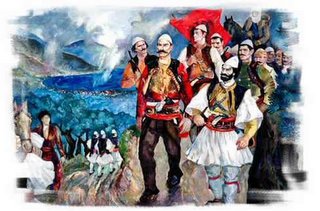

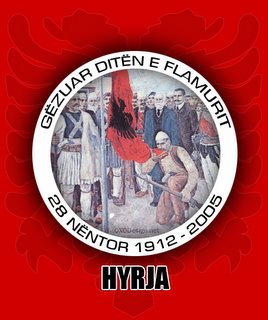 Ismajl Qemajli Burr daji Ne Vlor me flamur dor ka hije
Ismajl Qemajli Burr daji Ne Vlor me flamur dor ka hije